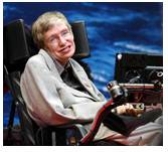题目内容
In my first week as a graduate student at Cambridge University in 1964 I met with a fellow student, two years ahead of me in his studies; he was unsteady on his feet and spoke with great difficulty.This was Stephen Hawking.I learned that he had a bad disease and might not live long enough even to finish his PhD degree.
But, amazingly, he has reached the age of 73.Even mere survival would have been a medical miracle, but of course, he didn’t merely survive.He has become arguably the most famous scientist in the world for his brilliant research, for his bestselling books, and, above all, for his astonishing victory over hardship.
Stephen received his “death sentence” in 1964, when I thought it was hard for him to go on with his study.Stephen went from Albans School to Oxford University.He was said to be a “lazy” undergraduate, but his brilliance earned him a first class degree, an “entry ticket” to a research career in Cambridge and a uniquely inspiring achievement.Within a few years of the burst of his disease he was wheelchair bound, and his speech was so unclear that it could only be understood by those who knew him well.But his scientific career went from strength to strength: he quickly came up with a series of insights into the nature of black holes (then a very new idea) and how the universe began.In 1974 he was elected to the Royal Society at the exceptionally early age of 32.
The great advances in science generally involve discovering a link between phenomena that were previously conceptually unconnected — for instance, Isaac Newton realized that the force making an apple fall to earth was the same as the force that holds the moon and planets in their orbits.Stephen’s revolutionary idea about a link between gravity and quantum(量子) theory has still not been tested.However, it has been hugely influential; indeed, one of the main achievements of string theory(弦理论) has been to confirm and build on his idea.He has undoubtedly done more than anyone else since Einstein to improve our knowledge of gravity and he is one of the top ten living theoretical physicists.

1.What impressed the author most about Stephen Hawking?
A.His brilliant research.
B.His bestselling books.
C.His serious disease.
D.His defeating hardship.
2.What made Stephen Hawking start his research career at Cambridge?
A.His death sentence.
B.His “lazy” attitude.
C.His above average talent and ability.
D.His rich experience.
3.It can be inferred that Stephen Hawking was born ________.
A.in the early 1940s
B.in the late 1940s
C.in the early 1930s
D.in the late 1930s
4.What can we learn from the text?
A.Hawking’s theory was proved years ago.
B.Hawking was not as successful as Newton.
C.String theory built on Hawking’s idea.
D.Hawking’s theory has had little influence on others.
5.Which of the following is Not True according the passage?
A.He achieved one success after another in his career despite his disease.
B.He couldn’t walk when the author first met him at Cambridge.
C.He not only survived his disease but contributed greatly to science.
D.He is among the greatest scientists to improve the knowledge of gravity.
 新题型全程检测期末冲刺100分系列答案
新题型全程检测期末冲刺100分系列答案
